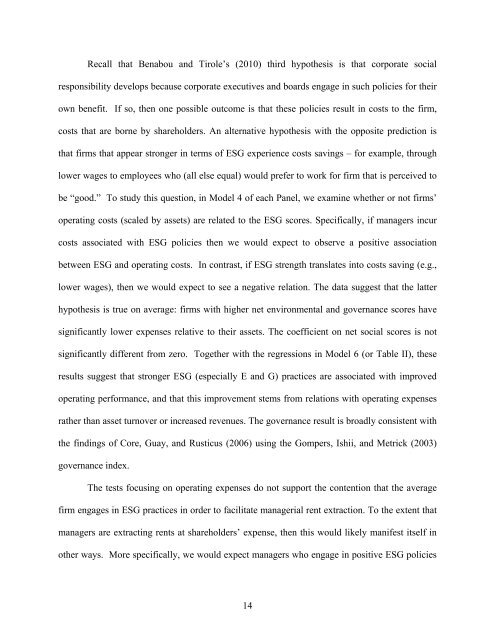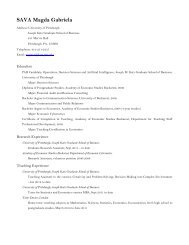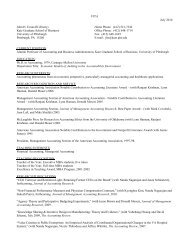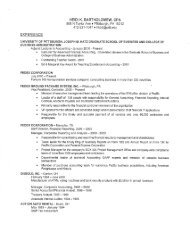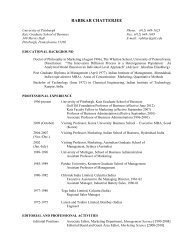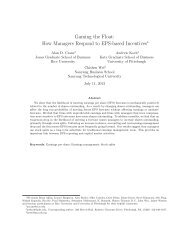Stuart L. Gillan, Jay C. Hartzell, Andrew Koch, and ... - Pitt Business
Stuart L. Gillan, Jay C. Hartzell, Andrew Koch, and ... - Pitt Business
Stuart L. Gillan, Jay C. Hartzell, Andrew Koch, and ... - Pitt Business
Create successful ePaper yourself
Turn your PDF publications into a flip-book with our unique Google optimized e-Paper software.
Recall that Benabou <strong>and</strong> Tirole’s (2010) third hypothesis is that corporate social<br />
responsibility develops because corporate executives <strong>and</strong> boards engage in such policies for their<br />
own benefit. If so, then one possible outcome is that these policies result in costs to the firm,<br />
costs that are borne by shareholders. An alternative hypothesis with the opposite prediction is<br />
that firms that appear stronger in terms of ESG experience costs savings – for example, through<br />
lower wages to employees who (all else equal) would prefer to work for firm that is perceived to<br />
be “good.” To study this question, in Model 4 of each Panel, we examine whether or not firms’<br />
operating costs (scaled by assets) are related to the ESG scores. Specifically, if managers incur<br />
costs associated with ESG policies then we would expect to observe a positive association<br />
between ESG <strong>and</strong> operating costs. In contrast, if ESG strength translates into costs saving (e.g.,<br />
lower wages), then we would expect to see a negative relation. The data suggest that the latter<br />
hypothesis is true on average: firms with higher net environmental <strong>and</strong> governance scores have<br />
significantly lower expenses relative to their assets. The coefficient on net social scores is not<br />
significantly different from zero. Together with the regressions in Model 6 (or Table II), these<br />
results suggest that stronger ESG (especially E <strong>and</strong> G) practices are associated with improved<br />
operating performance, <strong>and</strong> that this improvement stems from relations with operating expenses<br />
rather than asset turnover or increased revenues. The governance result is broadly consistent with<br />
the findings of Core, Guay, <strong>and</strong> Rusticus (2006) using the Gompers, Ishii, <strong>and</strong> Metrick (2003)<br />
governance index.<br />
The tests focusing on operating expenses do not support the contention that the average<br />
firm engages in ESG practices in order to facilitate managerial rent extraction. To the extent that<br />
managers are extracting rents at shareholders’ expense, then this would likely manifest itself in<br />
other ways. More specifically, we would expect managers who engage in positive ESG policies<br />
14


